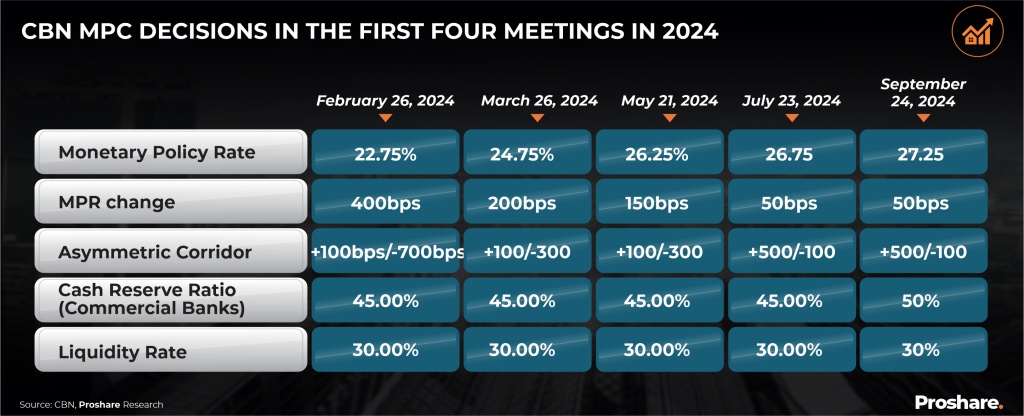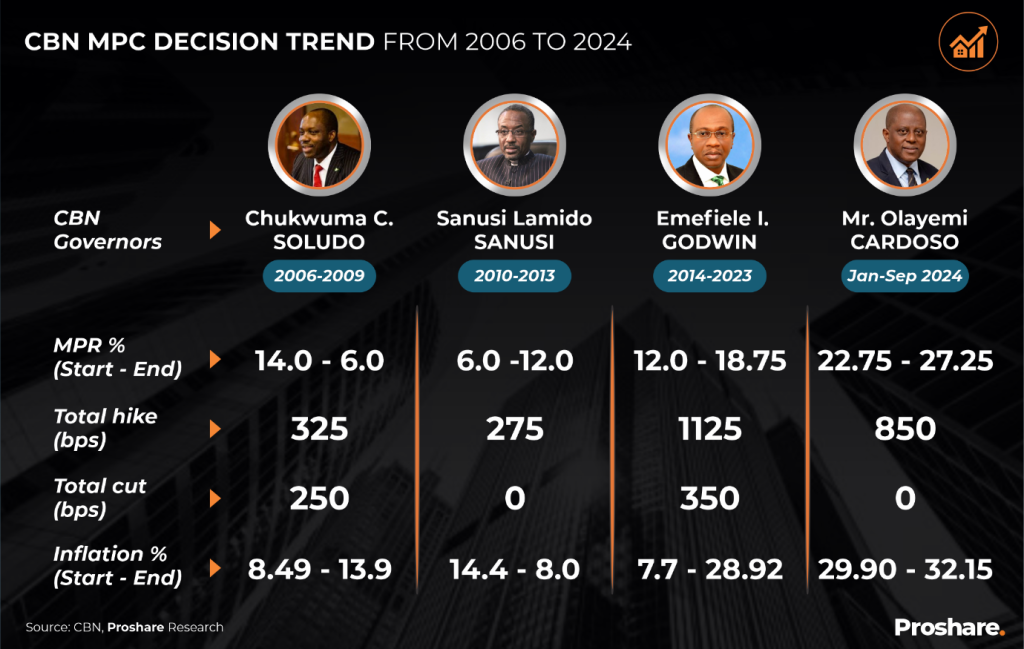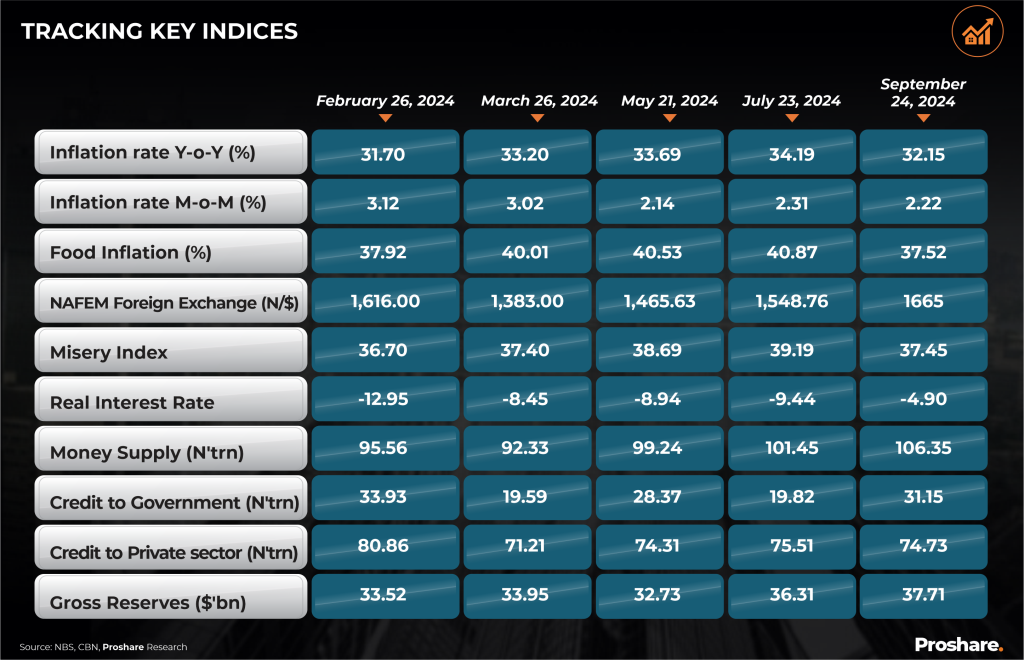CBN Raises MPR to 26.75%: Making Sense of CBN’s Policy Rate Hike

The Central Bank of Nigeria (CBN) Monetary Policy Committee (MPC) has raised its monetary policy rate (MPR) for the fifth consecutive time in 2024. At the end of its meeting on September 24, 2024, the apex bank raised the MPR by 50 basis points to 27.25% from 26.75%. The hike came against the backdrop of most analysts’ projections of a hold on rates (see Table 1 below).
Table 1:

Historical data indicates that the CBN MPC’s decisions have evolved, encompassing rate hikes, cuts, or holds. Each governor has introduced their vision for improving the Nigerian economy, resulting in notable policy shifts (see Illustration 1 below).
Illustration 1:

Key Economic Indicators Performance
Mixed outcomes were recorded following the last rates hike by the CBN MPC meeting held on July 23, 2024 (see table below).
Table 2:

Reactions/Developments Trailing Last Rate Hike
- A deceleration of inflation set in July 2024 from 34.205 in June 2024 to 32.15% in August 2024 driven by harvest season yields supporting food inflation moderation.
- Gross reserves have increased to $37.71bn on September 24, 2024, from $36.31bn on July 23, 2024.
- Federal Government has raised over $900million from its first-ever Domestic Federal Government of Nigeria (FGN) US Dollar Bond issuance.
- PMI remained strong at 49.7% in July 2024 from 48.8 points (a positive pointer to what the Q3 GDP growth would look like).
- Harvest season yields supporting food inflation moderation.
- The Naira rates against the dollar were unified across markets and remained stable but largely weak at N1665 on the official market on September 24, 2024 from N1,548.76
- Depreciated naira supported N6.95trn trade surplus in Q2 2024 to support further surplus in Q3 2024 but limited impact on reserves and currency appreciation.
- The risks from floods increased with the collapse of the Alau dam in Maiduguri, which affected about 526,703 people and displaced at least 207,907 people. Also, the Cameroon dam was released
- Energy cost increase impacting cost of transportation, business activities amongst others.
- The Nigerian bourse All share index dipped by -1.91% from 100486.12 on July 23, 2024, to 98,568.59 on September 24, 2024.
Analyst Opinion: Most Analysts’ projected a rate hold, but the CBN thought differently
David Adonri, HighCap Securities
“CBN is not buying into the official figures on inflation, which claim that inflation is moderating, hence, the continued tightening of monetary policy. Furthermore, justification for the hike in interest rate and CRR comes from emerging signs that markets are showing worrisome signs of overheating again. The Naira has recently started to take severe punches while equities are not relenting. With this tightening, equities are expected to cool down as financial assets migrate to debt. However, because monetary policy is short term, the impact will fizzle out when third quarter results start hitting the market.”
Seyi Akinbi, Investment Analyst
“Yields in the Fixed Income are expected to trend higher only if the CBN complements its actions with an attendant OMO auction to signal the tightening measurements, any increase in rates in the short term will be offset by further liquidity injection into the market in the coming months.”
Prof Uche Uwaleke, Director, Institute of Capital Market Studies, Nasarawa State University
“In matters like this, the CBN usually has information that may not be at the disposal of the public. All said, the task of taming inflation must be jointly tackled by both the monetary and fiscal authorities. So, the government has to play its part by controlling recurrent spending and focusing on productivity including through ramping up assistance to small businesses. The equities market may temporarily pull back due to rising interest rates. But if the current disinflation trend continues, it is a signal for likely cuts in interest rates in the near future, which should encourage long-term investors to take a position now.”
Dr. Bola Agbola, CEO LAM AGROCONSULT
“On the MPC today. I believe the drop in the inflationary rate is not significant enough to warrant monetary easing. Petrol price increase and minimum wage implementation will still stir some inflationary spike so it’s good to be cautious”
Dr. Muda Yusuf, CEO, CPPE
“It is quite troubling that at a time when manufacturers, entrepreneurs and other investors in the economy are craving for a breath of fresh air, the CBN chose to tighten the noose on them by resorting to a further tightening of monetary policy. The latest policy choice of the apex bank is at variance with the mood of most economic players…The private sector should not be made to pay the price of liquidity growth which they were not responsible for. The injection of liquidity into the system are largely public sector driven, as rightly noted by the CBN Governor…We believe that the policy decisions of the CBN are most inappropriate for the prevailing economic conditions and the challenges faced by entrepreneurs in the country.”
Closing Thought
In February 2024, when the CBN began its rate hikes, inflation was approximately 29.9%. Following over 850 basis points of increases, inflation has risen to over 32.15%. The recent decline in inflation over the past two months is largely due to falling food prices, highlighting the critical role of enhancing domestic food production. This indicates that while interest rate hikes are necessary, they are insufficient to combat inflation in Nigeria.
The market largely anticipated a hold on rates before the CBN’s recent hike. Notable risks driving inflationary pressures remain structural rather than monetary, raising the question of how an extra 50bps increase will address insecurity, food shortages, and flooding challenges. Should we rely on interest rates to mitigate the impacts of structural challenges driving inflation?
Proshare analysts opine that the stability discus focused on inflation targeting should be shifted from just inflation targeting and exchange rate unification to strategies for boosting foreign reserves, facilitating exchange rate appreciation, exponential measures to boost domestic food production, and attracting foreign direct investment that will give more gains and stability. These pressing issues at the core of Nigeria’s economic challenges require urgent attention and sustainable cushioning for households and Nigeria’s business/investment landscape.




